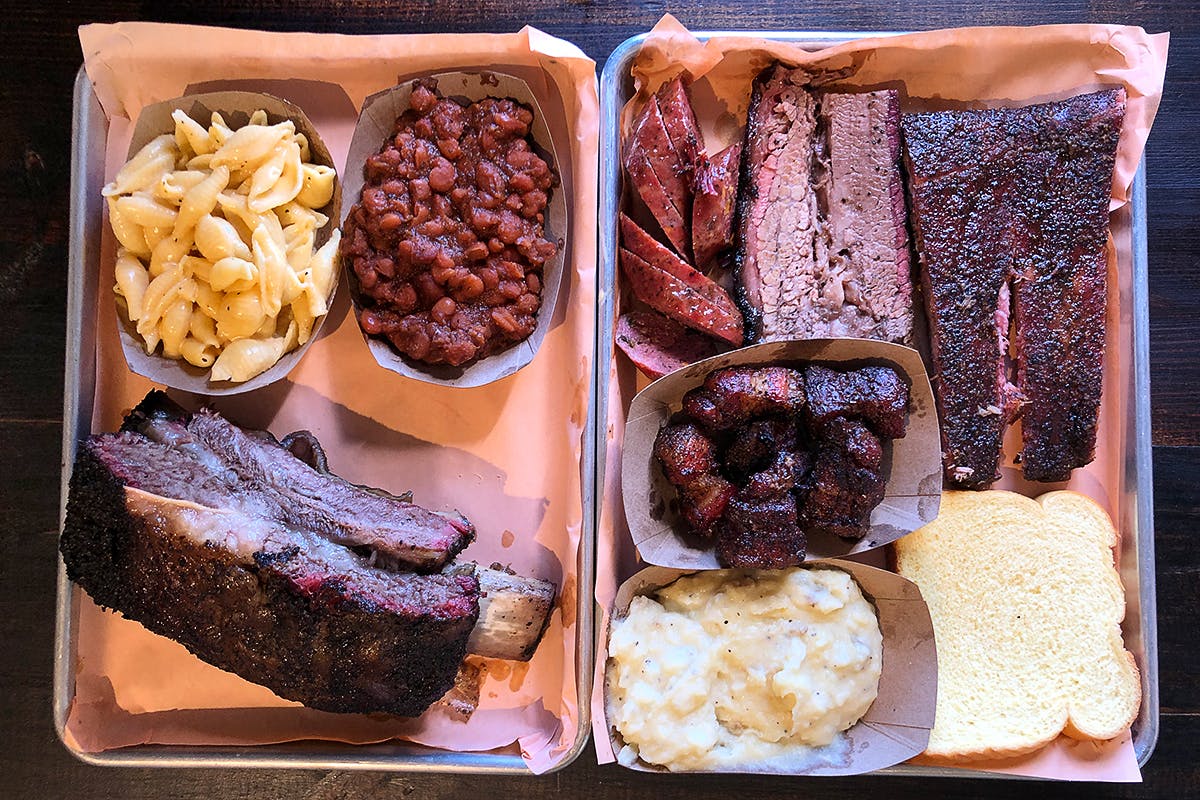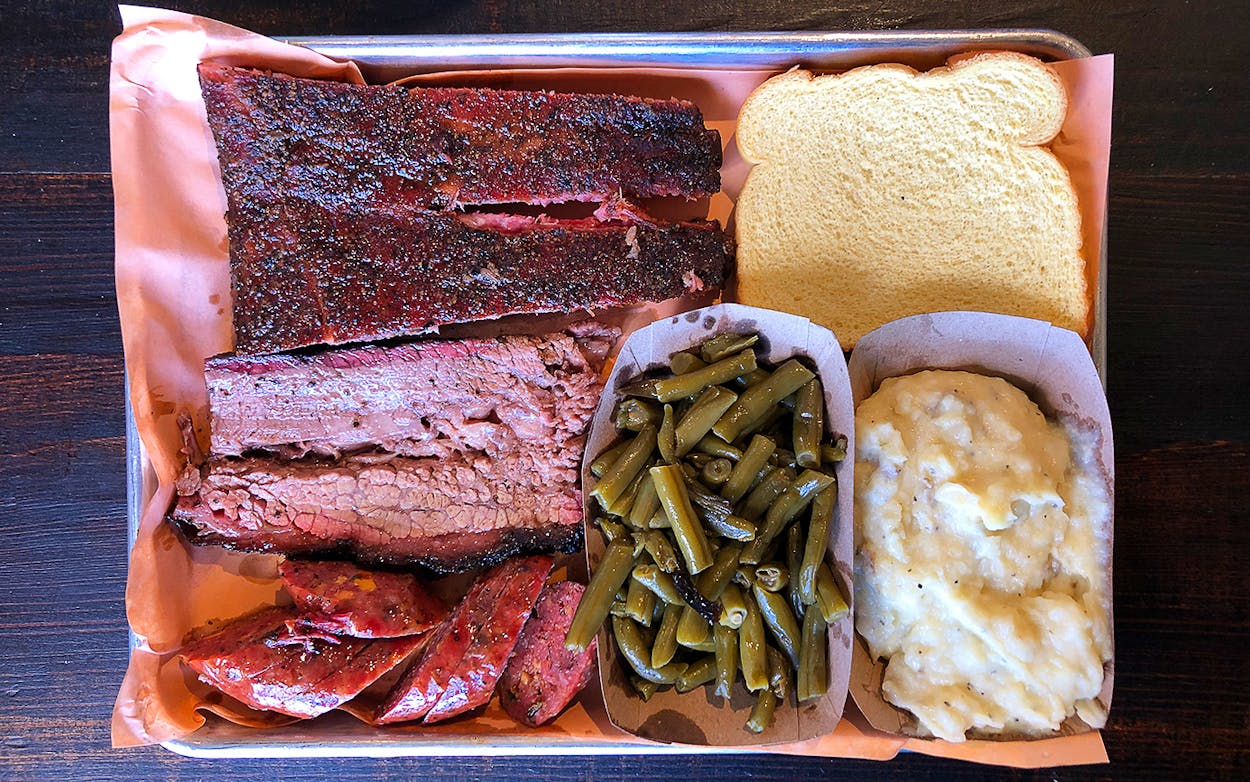Like many barbecue entrepreneurs, Jordan Wright began as a backyard hobbyist. He cooked on a Big Green Egg at his home in Fayetteville, Arkansas, on the weekends and enjoyed an easy life with his wife Amber, their kids, and a six-figure salary. In 2014, his job with Tyson Foods took him on a trip to Austin, where he hoped to try Franklin Barbecue. They were sold out, so he opted for the Salt Lick instead. “It was the first bite of moist brisket I’d ever had in my life,” Wright recalls. He wondered why Arkansas didn’t offer that kind of barbecue. The memory of that brisket lingered. It triggered an obsession and a series of events that put his family’s financial security in jeopardy and eventually led to the opening of Wright’s Barbecue.
“The Egg is the worst brisket cooking machine in the world,” Wright said about his previously beloved Big Green Egg. He searched for a new smoker that could replicate the brisket he had in Texas. Rather than hitting up the nearest big-box store, Wright tapped East Texas Smoker Company to build him a 250-gallon reverse-flow smoker. Welding it onto a trailer wasn’t good enough, so he had them mount it onto a food truck. He had never worked a single shift at a restaurant, or ever sold barbecue to the public, but he figured he was up for a new side gig. Wright picked up his new trailer in Tyler in 2016 and embarked upon a thorough Texas barbecue road trip.
Stanley’s Famous Pit Bar-B-Que was Wright’s first stop, and he was impressed with their brisket. Back in Austin, Evan LeRoy, then still working at Freedmen’s Bar, agreed to let Wright into his pit room for an accelerated apprenticeship. “I learned what a brisket felt like when it was done,” Wright said. That boosted his confidence for an upcoming barbecue competition in Houston, and he drove east out of Austin with high hopes.

The next day he cooked brisket, chicken, and ribs in competition against 36 other teams. When the results were announced, he was just hoping to make the top ten in any category. “They go through ten to one on chicken and ten to one on ribs, and we don’t get a call,” Wright remembers. Once the announcers had reached third place for brisket, it was setting in that he would leave the contest empty-handed. “My head was literally in my hands. I was like, I just spent $17,000 on this trailer, and I suck at barbecue,” he said. “I’d literally been up for 72 hours, and I was like, this freaking sucks.” Wright was preparing for a long, painful drive back to Fayetteville. Then they called his name. He’d placed first in brisket. “We went nuts,” he said.
Two weeks later, the Wright’s Barbecue food truck was open in Fayetteville. Wright served only on Saturdays at first, not yet ready to give up on his good-paying career. Trying to replicate his own first great brisket experiences in Texas, he watched Aaron Franklin’s videos and kept cooking every weekend. “Literally every Friday night, I was at home smoking meats,” Wright said. He kept the fires stoked all night after a full week at work and grabbed an hour or two of sleep when he could. At 5:30 on Saturday mornings, he would drive the food truck to the farmers market and serve until all the meat was gone. Eventually he attracted a following, one he largely credits to social media’s power, saying without any sarcasm, “Instagram is life for us.”
A couple years later, just after his third child had been born, Wright was ready to make the leap from the corporate world to a life in barbecue, or so he thought. He found a century-old house that had recently been a bakery and required some serious renovations. Taking out a loan was necessary to fund the repairs. Wright’s dad, a banker, didn’t think the business plan was solid enough, so Wright had to turn to another bank for the money. Meanwhile, Wright felt like he had enough catering jobs, events, and farmers market appearances lined up that it was finally time to put in his notice at work. But he soon learned a hard lesson about operating a food truck.
The first event Wright worked after putting in his notice was supposed to provide him the operating capital to keep building his business. “We had killed at that event a year prior,” he recalls. Unfortunately, as he was driving to the event with a smoker full of meat, he got a call announcing that the event was cancelled. “A storm came through,” he said. “My heart sunk.” He parked his truck on the empty event grounds and called his dad. “I’m just crying. I was like, ‘Dad, I can’t quit. How am I supposed to take care of my family with a food truck if it’s this fickle?'” His dad offered moral support. Wright got through his meltdown, the rain ended, and he sent word on social media that he had barbecue for sale. “This big group of Chinese Walmart employees in town for shareholders’ weekend showed up,” he said. Some friends came by to support him too, and by the end of the evening, enough people bought enough barbecue for him to break even.

Wright was still shaken by the experience. He went back to work the following week and asked to take back his notice. His immediate boss initially agreed, but he learned that his request was already in the system and that his position had been eliminated. This barbecue dream now had to become his reality. He served six days a week out of the food truck in the gravel lot next to the former bakery. When he wasn’t cooking barbecue, he worked on readying the old white house to become a barbecue joint. He added a counter inside where the meat could be cut in front of the customers. He’d settled on that service style after a trip to Killen’s Barbecue in Pearland. “I just loved the whole experience,” he said, remembering his visit as fondly as the beef rib he’d eaten there. In October 2017, he finally opened the doors to the restaurant. Wright’s wife Amber was happy to finally get her home back, since it no longer had to double as a catering kitchen.
I met Wright in Houston at a barbecue event in 2016. He also met Wayne Mueller of Louie Mueller Barbecue there, and Mueller offered advice on jumping into the barbecue business. “The only way it makes sense is if you love it,” he told Wright, and Wright never forgot that. It took me two years to finally make it to Fayetteville to try the Texas-style smoked meats at Wright’s Barbecue. They were planning to host their second anniversary celebration the week after my visit, and Wright had taken the weekend off to spend it fishing with his dad. With 32 employees, he felt confident enough in his crew to leave them alone.
Hunter Mays was working the block and sold me on the massive beef rib. They go for $35 with two sides. It wasn’t quite up to Killen’s Barbecue standards, but it was certainly the best you’ll find in Arkansas. The same can be said of the brisket. Maybe that’s not fair to Arkansas, a state known more for pork than beef barbecue, but it might also sound like faint praise for Wright’s brisket. It was smoked remarkably well through a night when temperatures dipped below freezing. The smoke, salt, and bark were all great, and the tenderness and juiciness did Texas proud. I also loved the juicy jalapeño cheese beef sausage they make by hand in the cramped kitchen. Wright learned the process after attending a sausage-making course at Texas A&M.
Back in the pit area, Alex Glass and Zach Drake worked three Moberg smokers, made in Dripping Springs. The first was there the day Wright’s Barbecue opened in 2017. They made $4,000 their first Saturday. “That was great. We were pumped. I remember celebrating,” Wright said. Now they do three times that amount on a normal Saturday. He would have never believed back then that they’d need the third smoker, but even now he describes the effort to get everything packed in three smokers as “a big game of Tetris.” A fourth smoker will be delivered soon. “I didn’t even know what cooking for the true masses even looked like,” Wright said reflecting on his days in the food truck. It’s now out of commission and sits empty beside the restaurant.
There’s more Texas influence here than just the smokers and the brisket. Bacon burnt ends were added to the menu after a visit to Heim Barbecue in Fort Worth in 2016. These aren’t as sweet as Heim’s, but they have three sauces to choose from at Wright’s, if you’re looking to dip any of your barbecue into one. “If I’m using a sauce at Wright’s, it’s the bold,” Wright told me. I liked the tangy sauce that used a good bit of mustard in the mix and went nicely with the peppery pork ribs, not that they needed any sauce.
I talked to Wright just after he’d closed on the purchase of that old white house and the five acres that surround it, after two years of leasing the property. “It’s probably the first time I’ve felt like I’m in the middle of a big risk,” he said over the phone, presumably with a straight face. I recounted the litany of risky moves he had just recounted in our conversation. “If you go make the best barbecue you can make every day, they’re gonna come,” he said. His advice to budding pitmasters out there who are looking to make the jump into the barbecue business is to focus more on the quality of your product than the profits, at least at first. “It’s about making customers happy,” he said, “and the product of making customers happy is you get paid for that.” That’s easier to do when you’re serving the best brisket I’ve ever found in Arkansas.
- More About:
- Brisket
- Wayne Mueller








